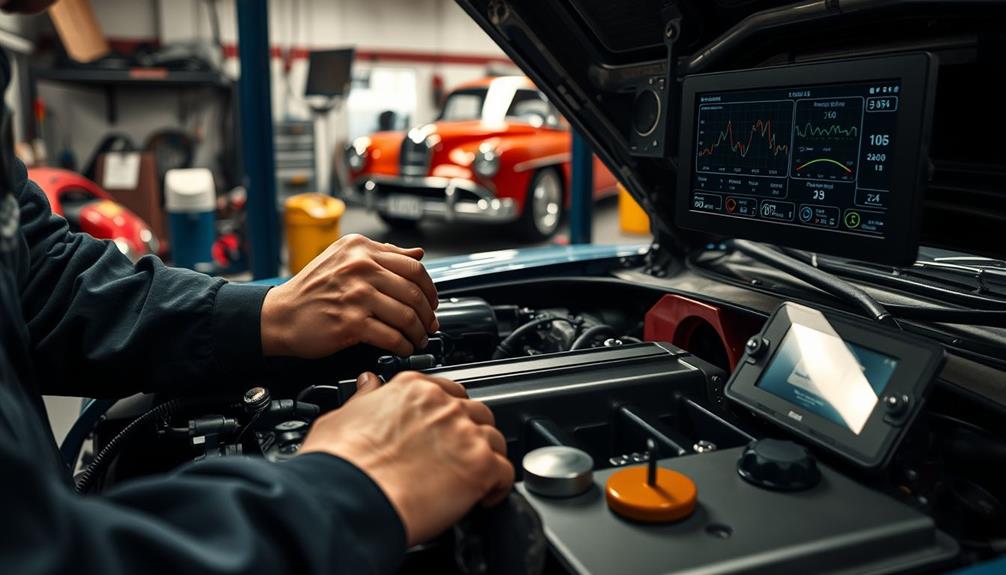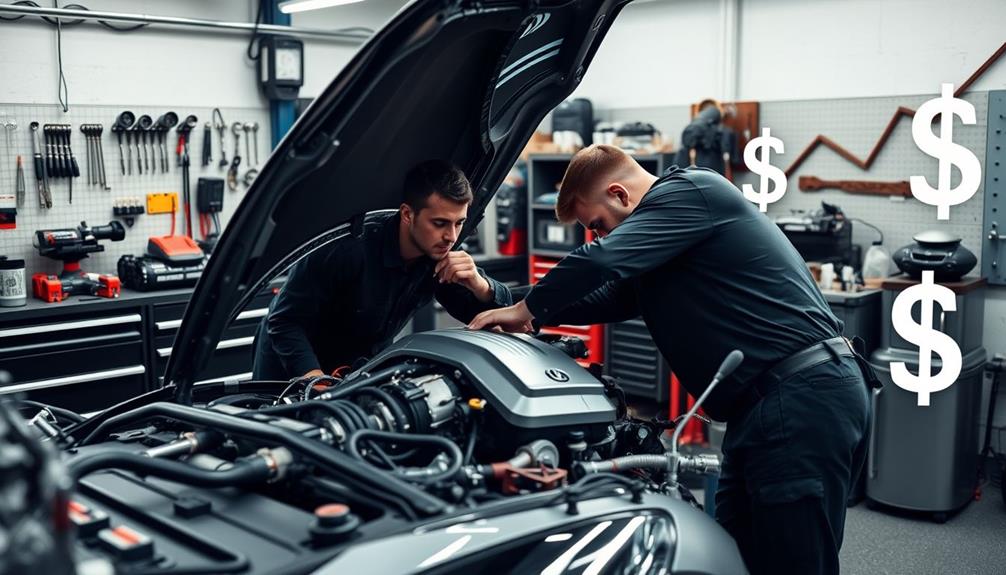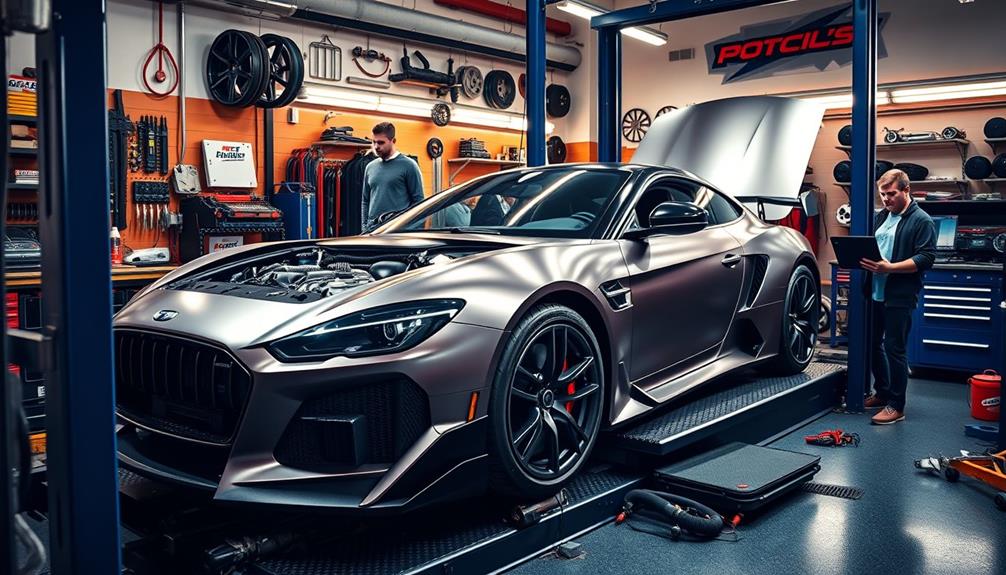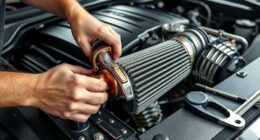To get a car tune that guarantees your vehicle performs at its best, start by considering engine modifications like ECU remapping, which can greatly enhance horsepower. Upgrade your suspension with adjustable coilovers for improved handling, and don't forget about your brakes—better pads and discs can make a big difference. You can choose DIY tuning to save money, but professional tuners provide expertise and reduce risks. Regular maintenance is essential before tuning to prevent issues, and always check local regulations for compliance. If you want to know more about advanced tuning techniques and their benefits, keep exploring!
Key Takeaways
- Assess your vehicle's current performance and identify specific tuning goals, like increased horsepower or improved handling.
- Choose between DIY tuning or hiring a professional tuner based on your skill level and desired outcomes.
- Research and select compatible tuning components, such as ECU remaps, exhaust systems, or suspension upgrades that fit your performance goals.
- Ensure compliance with local regulations and check for any warranty implications before proceeding with modifications.
- Regularly maintain your vehicle to prevent issues during the tuning process and maximize performance gains.
Understanding Car Tuning
When you immerse yourself in car tuning, you're fundamentally looking to bring out the best in your vehicle. Car tuning encompasses various modifications aimed at enhancing your car's performance, appearance, and overall driving experience.
Engine tuning plays a significant role, as it involves optimizing the air/fuel mixture, potentially through ECU remaps, to release the power of performance engines.
Suspension systems also benefit from tuning, where you can upgrade components like adjustable coilovers to improve handling and ride comfort. A well-tuned brake system guarantees you can stop effectively, using improved brake pads and discs for better control.
Understanding the balance between professional tuning and DIY efforts is essential. While professional tuning offers expert adjustments that enhance safety and quality, DIY tuning can save money but demands specific expertise and tools.
Regular maintenance is important to keep all these modifications functioning at their best.
Ultimately, engaging in car tuning not only boosts your vehicle's performance but also allows you to personalize it, making sure your ride reflects your unique style and driving needs.
Embrace the journey of tuning, and enjoy the improved performance it brings.
Key Tuning Components
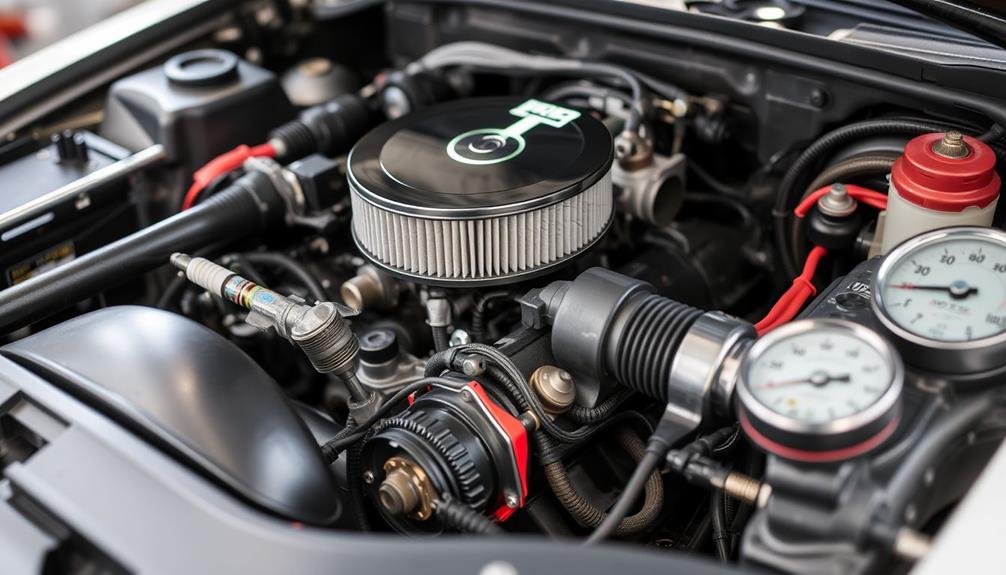
Several key tuning components can greatly enhance your vehicle's performance and driving experience. By focusing on these areas, you can greatly improve engine performance, fuel efficiency, and overall handling.
Here are four essential tuning components to evaluate:
- Engine Modifications: Upgrading air filters and installing turbochargers or superchargers can boost horsepower and torque by 20-30%. ECU remapping can further refine engine performance.
- Suspension System Enhancements: Modifying your suspension with lowering springs and adjustable coilovers improves handling and stability, reducing body roll and enhancing grip during turns.
- Brake System Upgrades: High-performance brake pads and rotors enhance stopping power and reduce brake fade. This is essential for maintaining safety during spirited driving.
- Exhaust System Modifications: Upgrading to a high-performance exhaust system reduces back pressure and improves horsepower while giving your vehicle a sportier sound.
Investing in these tuning services won't only elevate your vehicle's performance but also create a more enjoyable driving experience.
Each component plays a key role in optimizing your car's capabilities, ensuring it performs at its best on the road.
Benefits and Risks

While car tuning can reveal impressive performance gains, it's important to weigh the benefits against the potential risks involved. You can expect significant performance improvements, such as enhanced speed, acceleration, and fuel efficiency, with horsepower gains typically ranging from 10% to 20%.
However, improper tuning may lead to severe consequences, including engine damage and voiding your warranty. It's critical to evaluate regular maintenance, as well-maintained vehicles are less likely to face failures during tuning.
Financial investment in tuning can be substantial, so make sure to assess whether the expected performance gains justify the costs. Additionally, safety considerations must be a priority; enhancing your vehicle's performance necessitates upgraded brakes and suspension to maintain vehicle safety.
If you overlook these significant factors, you might face legal issues related to emissions if your modifications don't comply with local regulations.
Realistic expectations are important throughout the tuning process, as pre-existing engine issues can complicate matters further. Ultimately, staying informed about both the benefits and risks of car tuning will help you make the best choice for your vehicle and your driving experience.
DIY Vs. Professional Tuning
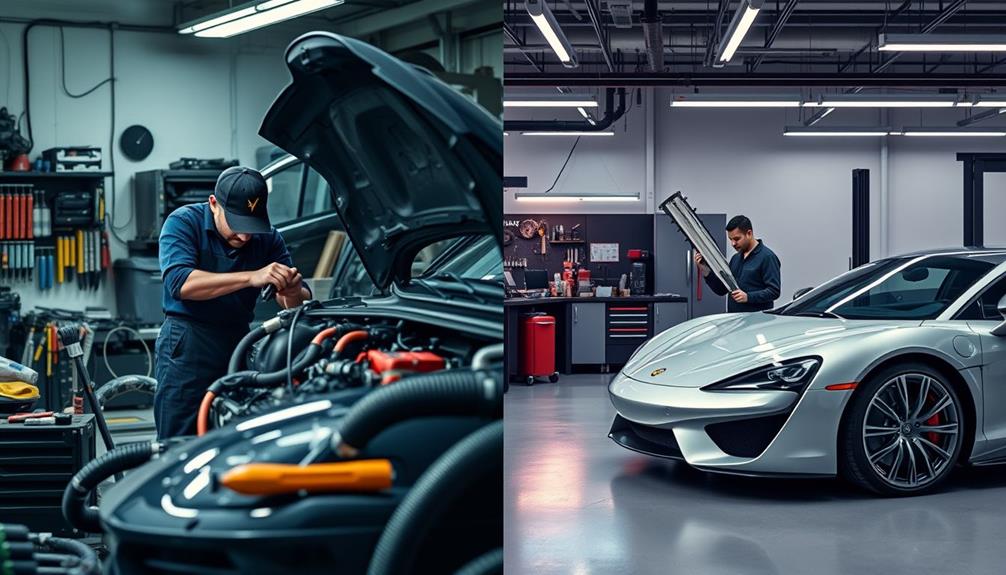
Tuning your car can be an exhilarating journey, but deciding between DIY and professional tuning is essential. Each option has its pros and cons, and understanding them will help you make the best choice for your vehicle performance.
Here are four key considerations:
- Expert Knowledge: Professional tuning provides access to experienced technicians who understand tuning technologies and can make high-quality adjustments.
- Cost vs. Value: While DIY tuning might save you some cash, professional services often prevent costly mistakes and guarantee compliance with legal standards.
- Safety Risks: Improper DIY modifications can lead to safety risks, whereas professionals guarantee that your car meets safety requirements during tuning.
- Performance Enhancements: For significant performance enhancements, professional tuning is recommended, as they use advanced equipment like dyno testing to achieve outcomes that DIY tuners may struggle to replicate.
Ultimately, if you're comfortable with your skills and have the right tools, DIY tuning can be rewarding.
However, for complex modifications or if you're unsure, professional tuning is the safer route to guarantee your car runs smoothly and legally.
Advanced Tuning Techniques
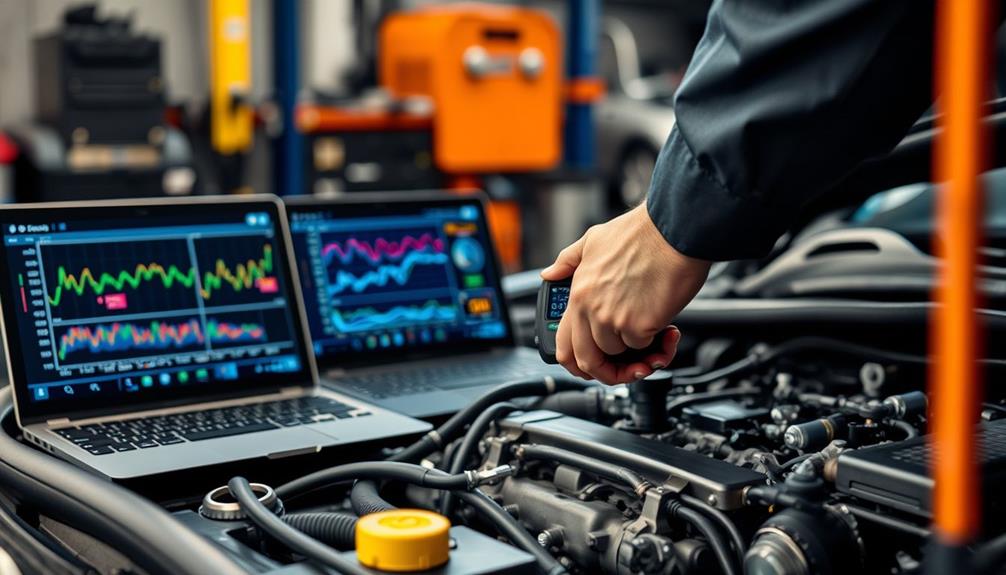
When it comes to maximizing your car's performance, advanced tuning techniques can take your ride to the next level. To achieve peak engine performance, consider these essential upgrades:
| Technique | Benefits | Expected Gain |
|---|---|---|
| ECU Remapping | Optimizes power delivery, torque, and fuel efficiency | 10-30% more horsepower |
| High-Performance Exhaust | Reduces back pressure for better engine breathing | 5-15% more horsepower |
| Cold Air Intake System | Allows cooler, denser air for improved efficiency | 10-20% more horsepower |
| Adaptive Suspension Systems | Adjusts to driving conditions for better handling | Enhanced vehicle stability |
| Aerodynamic Enhancements | Improves stability at high speeds and cornering | Better overall performance |
Frequently Asked Questions
Will a Tune Make My Car Run Better?
Yes, a tune can make your car run better. It optimizes performance by enhancing horsepower, torque, and fuel efficiency, while improving throttle response. You'll enjoy a smoother, more responsive driving experience after the tune.
How to Make Your Car Perform Better?
To make your car perform better, think of it as a finely tuned instrument. Upgrade your exhaust, install a cold air intake, and keep up with maintenance to release its true potential and enhance your driving experience.
How Much Does a Performance Tune Cost?
A performance tune costs between $300 and $1,500, depending on your vehicle's needs. Basic ECU remapping is cheaper, while extensive upgrades like turbocharging can soar over $1,000. DIY options might save you money, too.
Does a Tune Make Your Car Sound Better?
When it comes to car sounds, you're in the driver's seat. A tune can definitely enhance your vehicle's auditory experience, improving engine performance and delivering a more aggressive, sporty growl that turns heads.
Conclusion
In the end, getting a car tune is about enhancing performance, boosting efficiency, and opening up your vehicle's potential. Whether you choose DIY methods or professional help, the key is to understand your car's needs and make informed decisions. Embrace the journey of tuning, enjoy the thrill of improved handling, and relish the satisfaction of a well-tuned ride. So, gear up, immerse yourself, and let your car reach its true capabilities! As you begin the process of getting ready for a car tuneup, remember to prioritize regular maintenance and follow manufacturer recommendations. Keep an eye on your vehicle’s performance and be proactive in addressing any potential issues. With the right approach and attention to detail, you can unlock the full potential of your car and enjoy a smoother, more efficient driving experience. So, let the journey of tuning begin, and get ready for a car tuneup that will take your driving experience to the next level!
